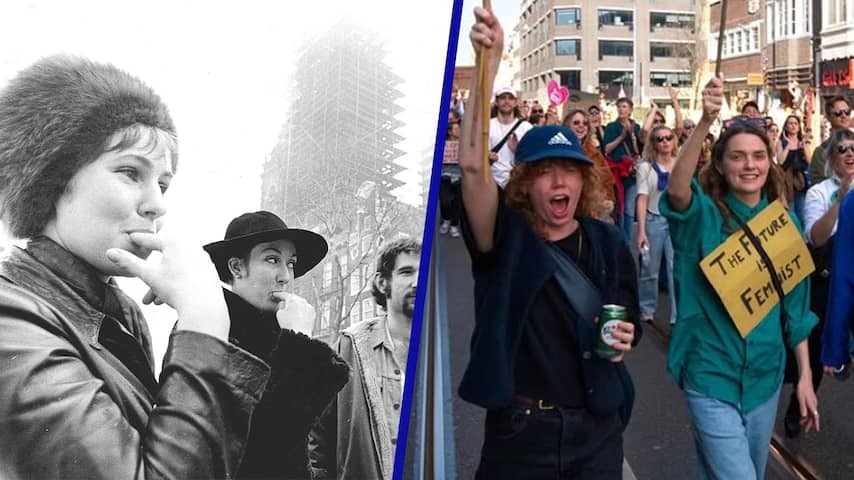
More than 55 years after their original founding, the feminist group Dolle Mina is resurfacing. The women activists behind slogans like ‘boss in your own belly’ are holding a protest march against femicide on Sunday. “We notice things are being turned back.”
How do you set a corset on fire? That was a question Dolle Mina Dunya Verwey had to find an answer to in 1970. A corset symbolized the oppression of women. Burning it was a symbolic action for equal rights, emancipation, and justice.
“I thought: I’ll buy a can of gasoline,” says Verwey in a video on Instagram. “But the gas station attendant asked me: what do you need that for?” The activist explained her plan, and the attendant turned out to be an ally. He sent her home with a tip: don’t use gasoline, but ethanol. It is typical of how the ‘mina’s’ kicked against the established order in those years with public actions.
That was more than half a century ago. In recent decades, the Dolle Mina’s only appeared in history books. Until the Instagram page ‘dollemina2025’ suddenly appeared in January of this year. The first post was a historical black and white photo. Three young women show their bare stomachs with “boss in your own belly” in lipstick, the slogan with which the women fought for the right to abortion.
With the message, the Dolle Mina’s announced their return. It concerns a number of older activists from the early days, together with a new generation of women. The movement has grown in recent months. “The fact that we are getting so many followers and responses is a sign that something is brewing,” Verwey told broadcaster AT5. “As if you are touching a string that has now started to vibrate.”
Women were not part of revolution
On Sunday, they have planned their largest action to date in Rotterdam. They are protesting against femicide, the murder of women, with a national protest march. The concrete reason is the murder of two women in one week in July. According to the Mina’s, this is not even an exception. “Every eight days a woman is murdered in the Netherlands,” the announcement of the march states.
The first action of the original Dolle Mina’s was the occupation of Kasteel Nijenrode in Breukelen. It housed the Institute for Business Administration, which did not allow women. That same day, the activists went to the statue of Wilhelmina Drucker in Amsterdam to burn a corset there. The activist Drucker (1847-1925) was the inspiration for the movement. Her nickname ‘Dolle Mina’ was taken over.
“We were frustrated that an entire socialist revolution was going on in Amsterdam, but that the relationship between men and women was not part of it,” Connie van Nieuwkerk looked back for RTV Utrecht. “The men had to speak, the women had to butter the sandwiches and take care of the men.”
‘They only see you as a sexual object’
In the months after the founding, bras were burned, demonstrations were held for the reimbursement of condoms and the establishment of crèches, so that women could work. The bare stomachs with ‘boss in your own belly’ also appeared regularly. An action in Amsterdam was aimed against whistling at women on the street. “They only whistle because they see you as a sexual object, not as a human being that you can talk to,” said Nora Rozenbroek, one of the founders of the movement at the time.
The lack of public women’s toilets also led to great frustration among the Mina’s. “Why can men get rid of their water in all the nooks and crannies of the city?”, Rozenbroek wondered according to historiek.net at the time. “Women, dare to demand!”, was the message to other women.
That message is still relevant, it recently turned out. Last month, after a protest by Dolle Mina Tilburg, all public toilets at the Tilburg fair became free. Previously, women and others who urinate sitting down had to pay 1 euro to use the toilets, while the dozens of urinals on the fairground were free.
In the course of the seventies, the movement quietly died out. But now it is time to “raise our voices again,” the group writes on Instagram. “We notice that things are being turned back somewhat,” Claudette van Trikt said earlier this year on Radio 1. She was there from the beginning. Van Trikt refers, among other things, to a growing anti-abortion movement and childcare that has only become more expensive.
The new generation of activists also criticizes the pay gap, sexism, and femicide. They argue that inequality is not improving. “In fact: it is increasing again.” As far as they are concerned, the flame can go back into the corset.